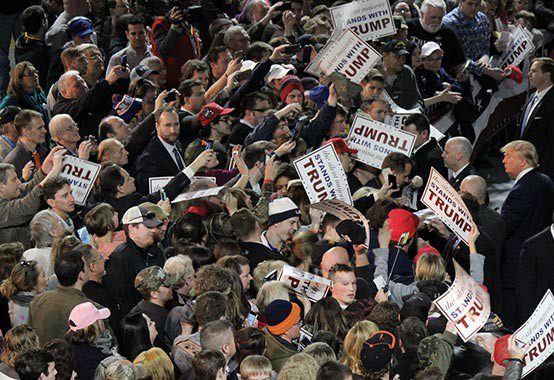Who Threatens Democracy?

The United States is currently facing a truly dangerous and unsettling political movement that poses real challenges to traditional concepts of democracy. That phenomenon is, of course, anti-Trumpism. Speaking personally, nothing could induce me to vote for Mr. Trump, but the violent opposition to him is becoming alarming.
“Trump Could Threaten U.S. Rule of Law, Scholars Say,” reads a New York Times headline. Specifically, these experts warn of his “contempt for the First Amendment, the separation of powers and the rule of law.” And if they are experts, and if the Times has bothered to telephone them, then their views are of course impeccably objective. There are multiple issues here, not least that another Clinton presidency would assuredly involve precisely the same hazards, and presumably to the point of impeachable crimes, yet the Times is not seeking expert opinions on those matters.
But right now, let us consider the “rule of law” in the present election. In San Jose, anti-Trump protesters just physically attacked and chased supporters leaving a meeting, and events like that are becoming commonplace. They are assuredly going to escalate over the next few months. That prospect determines attitudes on both sides. Every left-wing activist group knows it is duty-bound to express its opposition to Trump, and supporters know that they are likely to be attacked if they attend meetings.
We can guarantee that certain things are going to happen within the next two months. One is that at least a handful of Trump supporters are not going to turn the other cheek. They know they cannot rely on police protection, and so some will turn up to meetings prepared to defend themselves, possibly with firearms. At that point, someone is going to be wounded or killed. At that point, expect a media outpouring about the inherent violence of Trump, his supporters, and the political Right. These animals are vicious! When attacked, they defend themselves.
The other prediction we can make with fair certainty is that in mid-July, we are going to be facing a major political crisis. The Republican convention will be held in Cleveland July 18-21, and it will assuredly be held in a state of siege. The exact outcome of that event very much depends on police behavior, preparation, and organization. If protesters can be kept sufficiently far removed, then perhaps some semblance of order can be preserved. If not, it is possible that the convention itself might be forced to suspend its activities. Either way, it is highly likely that individual convention delegates and participants are going to be attacked and, conceivably, harmed.
Political protests on some scale are not new, and political conventions are a natural target. But in modern U.S. history, has there ever been a national election where the candidates of one party were simply unable to show their faces without being met by violence? Where mob action simply makes it impossible for one campaign to function? We are not here talking about the candidate of some neo-Nazi sect or Klan group, but the Republican Party itself.
Ultimately, this is all a matter of policing and the workings of the criminal-justice system. In recent years, American police forces have become very conscious of the need to avoid overreaction at protests and public gatherings, for fear of generating embarrassing film that shows up on YouTube. In a version of the notorious “Ferguson Effect,” they have become much gentler in their approaches than they were in earlier years. Witness, for instance, the decision to allow groups like Black Lives Matter to block roads without facing even the danger of arrest. The reasons for caution are understandable, but something has to change. If the police cannot maintain public order sufficiently to allow the functioning of something as critical as a national election, have we not ventured into a full-scale national crisis?
If national elections cannot be held in safety, has democracy not ceased to function?
Philip Jenkins is the author of The Many Faces of Christ: The Thousand Year Story of the Survival and Influence of the Lost Gospels. He is distinguished professor of history at Baylor University and serves as co-director for the Program on Historical Studies of Religion in the Institute for Studies of Religion.